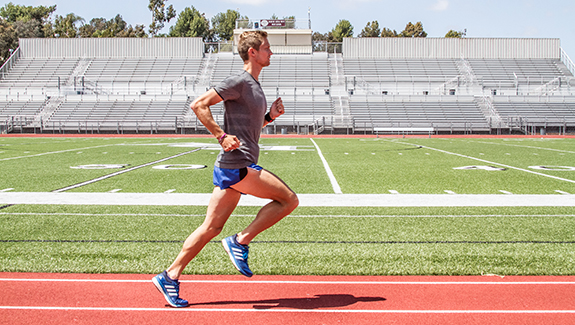Tips on Staying Hydrated From a Marathoner With an Ileostomy
Ileostomate and athlete Collin Jarvis shares his recommendations for staying hydrated when you’re physically active.

Get tips on how to manage your fluid intake and avoid dehydration.
My name is Collin and I had ileostomy surgery in 2014 when I was on the Cross Country and Track & Field teams at the University of California – Berkeley. Staying hydrated was always an important aspect of my athletic performance, but after I had surgery, it became even more critical for me to drink enough fluids. Why? Because having an ileostomy can meaningfully reduce the body's ability to get hydrated.1,2
Over the last decade I have continued to compete as an endurance athlete. Below are my top three tips for new ostomates looking to stay on top of their hydration:
Tip #1 – Make sure you are getting enough hydrating fluid throughout the day
It can be challenging to keep up with fluid intake, especially when living with an ileostomy.3 I know this from personal experience!
Start by talking to your clinician about how much fluid you need on a daily basis. They will be able to point you to the best resources for your specific needs. General guidance is available online, but every body is unique. Keep in mind that the resources you come across online are going to be calculating fluid needs for a person who has all of their internal organs. So once you identify that baseline, ask your doctor if you need to increase your fluid intake above that level. In my case (i.e., as someone who is extremely active and has had their entire large intestine removed), I take in about 20% more fluids than what the average online calculator recommends.
Tip #2 – Be aware of when and how you are taking in your fluids
Make sure to spread out the volume of liquid that you’re drinking as evenly as possible. In other words, take small and frequent sips throughout the entire day. This is important because our bodies are not perfectly efficient at absorbing the fluids that we put into them.
For example, you may have determined that you need around 100 ounces of liquids each day to meet your hydration needs. However, if you were to wake up in the morning and drink all 100 ounces right away, you would end up urinating most of that water out. In addition, drinking too much water at one time can dilute your body of the electrolytes it needs to properly absorb water which can exacerbate dehydration. Spreading out your fluid consumption evenly throughout the day is going to allow your body to work most effectively.
Tip #3 – Supplement with electrolytes
Another tip is to focus on getting the right balance of electrolytes as you hydrate. Electrolytes serve several important functions in our bodies’ processes, but in terms of staying hydrated, the important thing to know is that we need them to efficiently absorb the fluids that we drink. Since many of us with ostomies will be taking in more fluid throughout the day to meet our new daily requirements, we may have an increased need for electrolytes as well.4,5
Generally speaking, sodium, potassium, and magnesium are the big three to look for in supplements, but work with your healthcare professional to determine what mix of electrolytes would be best for you and your body.6
It makes sense to stay on top of your hydration
Regardless of whether you are dealing with severe dehydration issues or are just learning more about how to live well with your ostomy, I would highly encourage you to evaluate your daily hydration routine. Consuming the right amount of fluids will help keep your body functioning properly. Happy hydrating!
References:
1. Justiniano, Carla F et al. “Readmissions With Dehydration After Ileostomy Creation: Rethinking Risk Factors.” Diseases of the colon and rectum vol. 61,11 (2018): 1297-1305.
2. Chen, Sophia Y et al. “Predicting the Risk of Readmission From Dehydration After Ileostomy Formation: The Dehydration Readmission After Ileostomy Prediction Score.” Diseases of the colon and rectum vol. 61,12 (2018): 1410-1417.
3. Absorption of Water and Electrolytes (colostate.edu) - http://www.vivo.colostate.edu/hbooks/pathphys/digestion/smallgut/absorb_water.html
4. National Research Council (US) Committee on Diet and Health. Diet and Health: Implications for Reducing Chronic Disease Risk. Washington (DC): National Academies Press (US); 1989. 15, Electrolytes. Available from: https://www.ncbi.nlm.nih.gov/books/NBK218740/
5. Arenas Villafranca, Jose J et al. “Protocol for the detection and nutritional management of high-output stomas.” Nutrition journal vol. 14 45. 9 May. 2015.
6. Shrimanker I, Bhattarai S. Electrolytes. [Updated 2023 Jul 24]. In: StatPearls [Internet]. Treasure Island (FL): StatPearls Publishing; 2023 Jan-. Available from: https://www.ncbi.nlm.nih.gov/books/NBK541123/
Collin received compensation from Hollister Incorporated for his contribution to this article. The testimonials, statements, and opinions presented are applicable to the people depicted. These testimonials are representative of their experience, but the exact results and experience will be unique and individual to each person. Please make sure to consult with your healthcare professional for further guidance and instruction. The information provided herein is not medical advice and is not intended to substitute for the advice of your personal physician or other healthcare provider.




